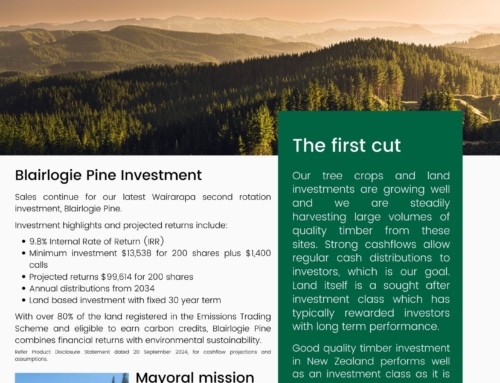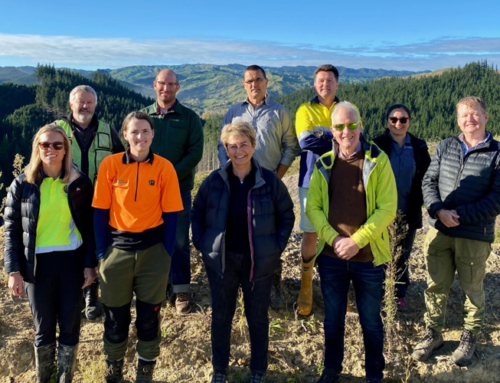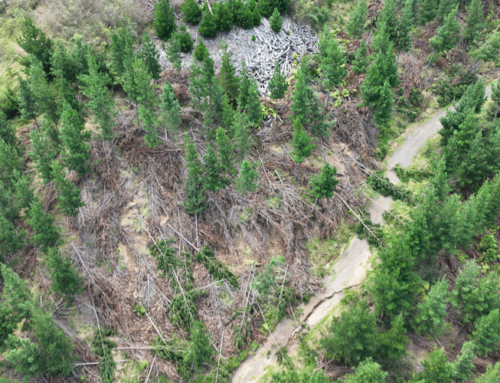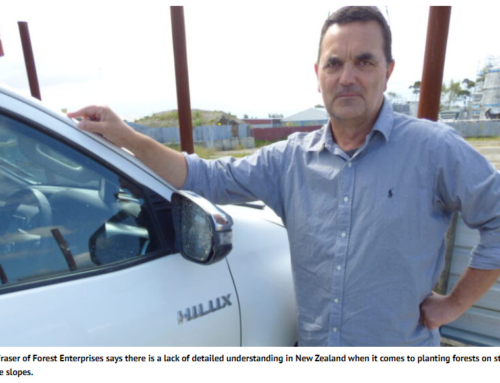Our forestry investments are an opportunity to invest in the rural sector with the land and the tree crop providing rewards. Recent years have seen the Emissions Trading Scheme place a value on the emissions sequestered by the tree crop, known as NZ Units, or carbon credits.
Our land value continues to rise, as rural land value is in high demand particularly from overseas investors. This means the value of your investments increases as our investors own the underlying land. Carbon value is flat currently, having risen strongly from its early lows but settled below peaks seen last year. Currently at about $50 per unit, carbon has increased the value of the post-1989 classified land in the investments. Tree crop value currently is showing green shoots after a very tough run in March and April. International log prices are slowly rising but demand is subdued. Domestic sawmill price is good though, so stumpage is low but rising.
The weather has certainly improved especially compared with the storms of 2023, and our investment land is in good condition with harvesting of damaged crop either completed or in progress. The rest of the rural sector is having a tough time with sheep and wool at low points and the dairy industry selling their treasured brands. Forestry is robust relatively speaking but it remains vital to operate to the conditions and manage risk from regulatory standards including environmental and health & safety rules.
It’s hard but we are making solid progress.
Bert Hughes
CEO & Forestry Director
18 June 2024

Changing of the Guard
Change is a given in the journey of any 52-year-old company. The strength of Forest Enterprises has been in its careful transition and succession of key roles and ownership throughout this time. The passion and expertise of our people is our greatest asset in ensuring your forests and your investments are managed to the highest professional standards.
Graeme Tindall, Managed Investments Director, former shareholder and Chairman of the Forest Enterprises Limited Board, leaves us after 27 years of service. He’ll be missed by many of our investors who have appreciated his prudent stewardship of their Investments over this time.
Nicola Black, has been appointed as Head of Managed Investments, and has been working with Graeme for the past 6 months to transition his responsibilities. Nicola has extensive experience at a Big 4 accounting firm and was formerly CEO of an agri-software company.
Gordon Wong, Legal Services Director, replaces Graeme as Chair of the Forest Enterprises Board. Liz Brown, previously Group Finance Manager, has joined the Forest Enterprises Limited Board as Finance Director, replacing Graeme as a Director.
Dan Fraser, Gisborne Regional Manager, leaves us after 7 years leading the Gisborne team. Dan’s decision to step down marks the end of his 33-year career in forestry which has been full of many challenges that Dan has risen to admirably, as demonstrated by his careful management of our Gisborne Forests following Cyclone Gabrielle.
Warren Rance joins us on 1 July, stepping into the Regional Manager role for Gisborne. Warren joins us with significant forestry and business management experience and is looking forward to contributing to the regional forestry industry and shareholder value.
Tom Otterson, Harvest Operations Manager, has increased his shareholding in Forest Enterprises Growth Limited from 5% to 10% recognising the need to ensure the future of Forest Enterprises remains in good hands.
As always, we appreciate the trust you place in us to manage your forests and your investments, and while some name tags might be changing, our commitment to “Creating wealth. Naturally.” is unchanged.
Government recognises forestry critical to NZ outlook
Friday’s announcement by the Forestry Minister introduced a drive to unlock forestry’s growth potential, demonstrating the Government’s commitment to restore certainty and confidence in the forestry and wood processing sector.
In a fresh take on forestry, the Minister recognised that “Forestry’s success is critical to rebuilding New Zealand’s economy, boosting our GDP and providing regional jobs in a highly productive sector.” This sentiment was backed by a commitment to support growth in the sector while easing some of the regulatory burdens including ensuring the Emissions Trading Scheme is cost-effective and efficient for participants.
After a winter of discontent following the weather events of 2023, it is promising to see the first buds of growth and acknowledgement of the forestry sector’s vital contribution to economic prosperity and international climate obligations.
Taxable income vs distributions
Taxable income vs distributions
Those with harvesting forests may have noticed a difference between the distributions we have paid you and the taxable income you are required to declare. It is important to declare the taxable income we advise, not the distributed income.
There are 3 main causes for these differences:
- When harvest roads are constructed, the roads are considered a capital asset, and not an expense. Road assets are depreciated annually reflecting the decline in value over time. This depreciation continues in accounting periods after harvesting or road building is completed.
- The second is timing. Some distributions occur after balance date. Tax liability occurs when the income is earned by the investment, not when distributions are paid to investors.
- A third cause is the investment’s upcoming expenses for the year – broadly, insurance, rates, and replanting. While income of the investment, we don’t distribute all these proceeds as it is more efficient for us to retain the estimated expenses for the upcoming year than to require a call to recover these expenses.
It is important to declare the taxable income we advise, not the distributed income








